How to Serve Your Country in the WAVES or SPARS (1943): Roles, Training, Pay, and Life on Duty
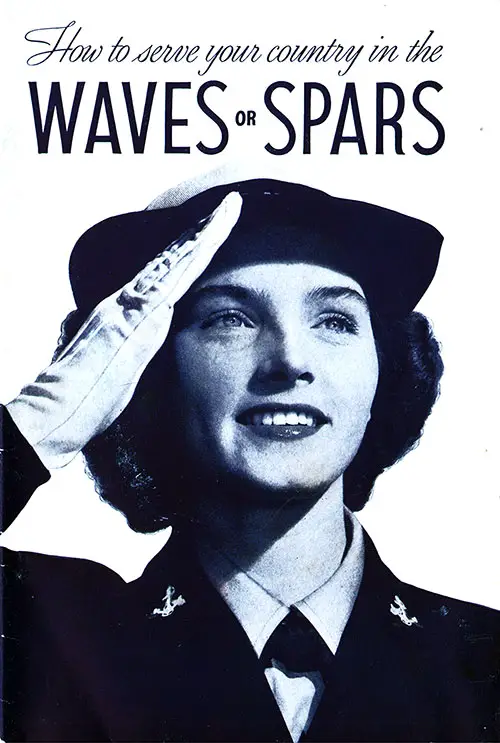
Front Cover, How to Serve Your Country in the Waves or SPARS, 9 January 1943. United States Navy Brochure. | GGA Image ID # 2230ac1d05
📌 Authoritative 1943 U.S. Navy/Coast Guard recruitment brochure for WAVES & SPARS: who could join, training at colleges, duty stations, pay, $200 Mainbocher uniforms, Q&A, and how to apply—vital context for teachers, students, genealogists, historians, and veterans.
Review & Summary (for educators, researchers, and enthusiasts) 🎓📚
What this is:
A January 9, 1943 wartime recruitment pamphlet explaining how American women could join the WAVES (U.S. Navy) or SPARS (U.S. Coast Guard). It covers why service mattered, who was eligible, where training happened (notably at civilian colleges), what jobs were available (office/admin, communications, aviation support, mechanics, parachute repair, storekeeping), how much recruits were paid, and how to apply—plus a large FAQ.
Why it’s compelling:
It captures a pivotal moment when women’s service moved from ad-hoc to structured, with equal pay for equal rank at shore stations—an early step toward integration. ✨
It frames service as patriotic, professional, and skilled, not “glamour work,” and uses first-person testimonials (e.g., a typist turned yeoman; a radio hobbyist becoming a CG radio operator) to humanize the pitch. 🗣️
It documents training at major colleges (Hunter College, Indiana University, University of Wisconsin, Iowa State Teachers College, etc.), showing the deep partnership between higher ed and the sea services. 🎓⚓
Relevance by audience:
Teachers & Students: Ready-made primary-source excerpts to discuss home-front mobilization, gender & labor history, and military-higher-ed partnerships. Great for DBQs and classroom debates. 🍎
Genealogists: Clear eligibility rules, training pipeline, and duty-station geography (CONUS only) help reconstruct an ancestor’s likely path—even when specific unit records are thin. 🧬
Historians: A crisp snapshot of 1943 policy—pay tables, uniform allowances, Q&A governance, and the early professionalization of women’s technical roles in naval services. 📜
Veterans & Families: Shows how predecessors served with equal rank/pay, anchoring today’s integration in WWII precedents. 🇺🇸
Most Engaging Content (and why) 🌟
“To every woman who wants a part in winning this war” – A signed message by the Secretary of the Navy (Frank Knox) sets a serious, nation-wide call to action. It frames women’s shore duty as the linchpin that frees men for sea combat.
Training-as-College – Vivid campus images and descriptions of dorms, dining halls, and class schedules make the experience relatable, while drilling and military cadence emphasize discipline.
Uniforms by Mainbocher & the $200 Allowance – The fashion-history angle (designer Mainbocher) plus a precise dollar figure (and itemized clothing list) blends culture, economics, and military readiness. 👗⚓
Pay & Promotion Table – Transparent pay steps from Apprentice Seaman to Acting CPO, reinforcing “earn the same pay as men of equivalent rank” at shore stations—a crucial equity point. 💵
Q&A Section – A remarkably practical, 1943-contemporary FAQ that answers the questions recruits actually asked: marriage, weekends, dates, uniforms, requests for duty locations, and more. ✅
To every woman who wants a part in winning this war
Never in history have American women been offered such a chance to serve their country, and never has there been such an urgent need for their service.
This is total war — a war in which every woman, as well as every man, must play a part. The Navy and Coast Guard men are in for one reason alone — to fight! They're in to fly the planes, man the ships, smash the Germans and laps.
But to keep them fighting, there are important service jobs that must be carried on at home — man-size, full-time jobs that you, the women of America, can fill — jobs in which you can serve your country in your country and release the men to fight at sea.
That is what you — as a member of the WAVES or SPARS — can do to help win this war. How you can do it is explained in detail in this book. Read every word of it. Then take a step you'll be proud of — volunteer for the WAVES or SPARS today.
Secretary of the Navy
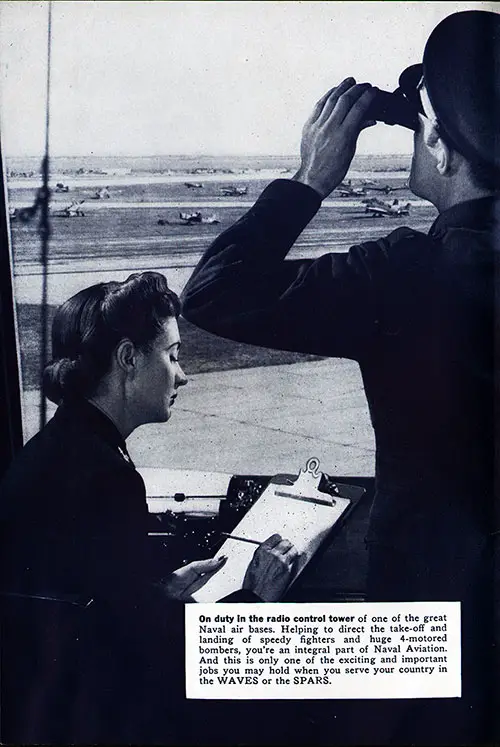
On Duty in the Radio Control Tower of One of the Great Naval Air Bases. Helping to Direct the Take-Off and Landing of Speedy Fighters and Huge 4-Motored Bombers, You’re an Integral Part of Naval Aviation. and This Is Only One of the Exciting and Important Jobs You May Hold When You Serve Your Country in the WAVES or the SPARS. | GGA Image ID # 2230c7beb0
What are the WAVES and the SPARS?
The WAVES is an organization of women who replace Navy men at shore stations, and the SPARS is an organization of women who replace Coast Guard men at shore stations.
As a member of the WAVES or SPARS, you can wear the same Navy blue, win the same ratings, and earn the same pay as America's finest fighting men.
And you'll hold the same shore jobs that men now fill. At Navy and Coast Guard bases throughout the continental United States, WAVES and SPARS do all types of office work. They are also needed to fill radio, communications, and storekeeping jobs. Some are required for essential posts in mechanics and aviation groundwork — as machinists, for example, or as operators of the Link Trainer, that fantastic device that teaches future Navy pilots the principles of flying. Other women are needed for various special or technical positions.
Whatever your work, wherever you go, you can be sure that you are performing a vital service for your country. It won't be any picnic. It's not a part-time "glamour" job — and it's not meant to be. You are as much a service member as any man with the fleet. It's full-time work. It will be hard work. But as you're the sort of woman who loves America and honors the brave men fighting to keep it free, it's work you'll be proud to do.
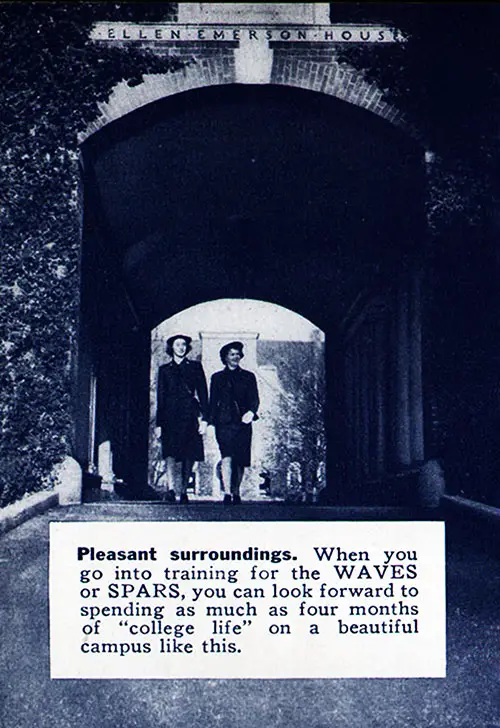
Pleasant Surroundings. When You Go Into Training for the WAVES or SPARS, You Can Look Forward to Spending As Much As Four Months of “College Life” on a Beautiful Campus Like This. Serve Your Country in WAVES or SPARS, 9 January 1943. | GGA Image ID # 2230ca202b
There are important positions in the WAVES and SPARS for women with experience in practically every field of business and industry. Have you worked in an office as a typist, secretary, business machine operator, filing clerk, or bookkeeper? You will find ready use for your skills.
Have you sold merchandise or checked stock in a store? Do you know anything about radio, telegraphy, or photography? Have you ever worked in a library, served at an information desk or telephone switchboard, or done tailoring or sewing? Do you have a mechanical "bent"? If so, your knowledge and experience will be valuable to the Navy. And it will help you get rapid promotions and better pay.
On the other hand, suppose you have no special skill or experience. There is a place for you, too, in the Navy.
If you can meet the physical and educational requirements, Navy training will take care of the rest. In a few short months, you will be fit for the post where you will be of greatest service to your country and to yourself. The following pages provide information about this training and where you can obtain it.
Pleasant surroundings. When you go into training for the WAVES or SPARS, you can look forward to spending as much as four months of "college life" on a beautiful campus like this.
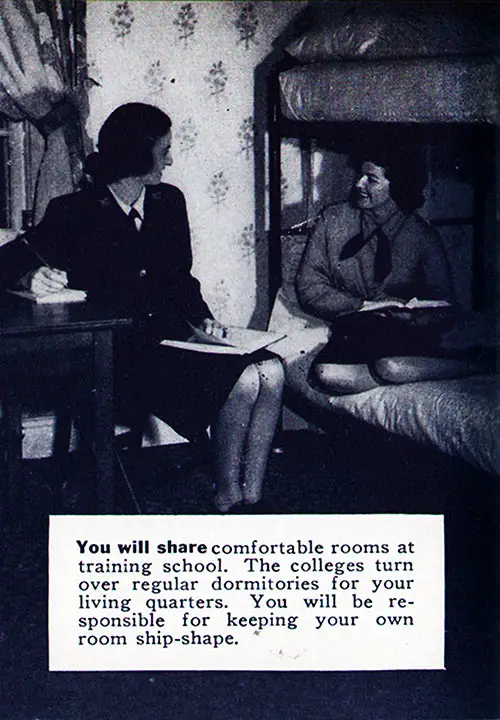
You Will Share Comfortable Rooms at the Training School. the Colleges Turn Over Regular Dormitories for Your Living Quarters. You Will Be Responsible for Keeping Your Room Ship-Shape. Serve Your Country in WAVES or SPARS, 9 January 1943. | GGA Image ID # 2230cc4924
Good food and plenty of it — paid for by the Navy! No hurried drugstore counter lunches for women at the training school. You'll enjoy full-course meals served in the college dining hall.
Future radio operators get expert training in the Navy. Skilled instructors and the finest equipment will help you do a better job for your country now and land a better peacetime job later.
First, you'll train at a leading college.
After being sworn in and ordered to active duty as an enlisted WAVE or SPAR, you will go first — at government expense —to one of the training schools. These are located at colleges in every part of the country. Typical of these are Hunter College in New York City, Indiana University at Bloomington, Indiana, Oklahoma Agricultural and Mechanical College at Stillwater, Oklahoma, the University of Wisconsin at Madison, Wisconsin, Iowa State Teachers College at Cedar Falls, Iowa, and Georgia State College for Women at Milledgeville, Georgia. The school to which you are assigned depends on the type of job for which you are being trained.
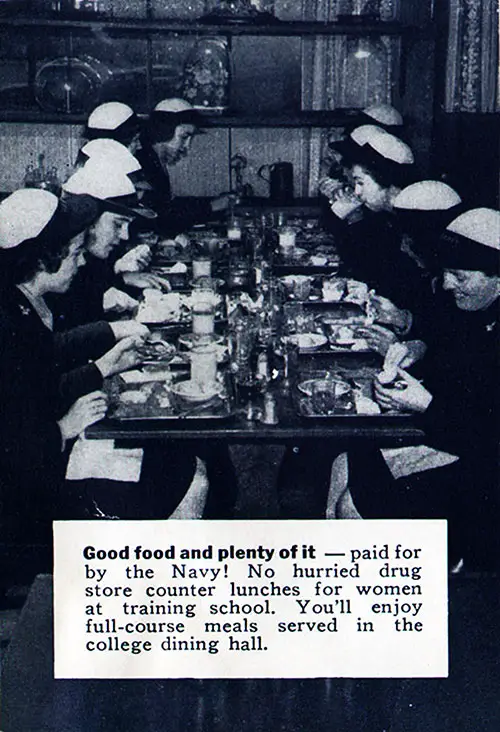
Good food and plenty of it — paid for by the Navy! No hurried drug store counter lunches for women at training school. You’ll enjoy full-course meals served in the college dining hall. Serve Your Country In WAVES or SPARS, 9 January 1943. | GGA Image ID # 223129b822
The training period averages four months. The first month is devoted to general indoctrination. You'll get into the swing of real Navy life during this time. You'll learn Navy and Coast Guard traditions and regulations. You'll learn the fundamentals of drilling. You'll get up at reveille and go to bed at taps. You'll speak the Navy language. You'll call the floor of your room "the deck." The walls, "bulkheads." The stairs, "ladders." The windows, "ports."
After indoctrination, some will be assigned to active duty. In contrast, others will receive special training, the length of which will vary. For instance, if you are an expert typist, you might qualify as a Yeoman as soon as you finish your indoctrination. But if you are studying for a more technical job, you will take the full-time course. And you might even be sent to a Navy trade school after that for further training by Navy experts.
You'll follow an interesting schedule.
During your indoctrination training, you'll be living in the college dormitories. Like a college student, you'll be expected to make your bed and keep your room tidy. But you'll not have to do any "messing" — no cooking, waiting at the table, or washing dishes.
As in college, most of your time will be spent in your classes or studying. You'll have a certain amount of marching and drilling, but also time for sports and recreation.
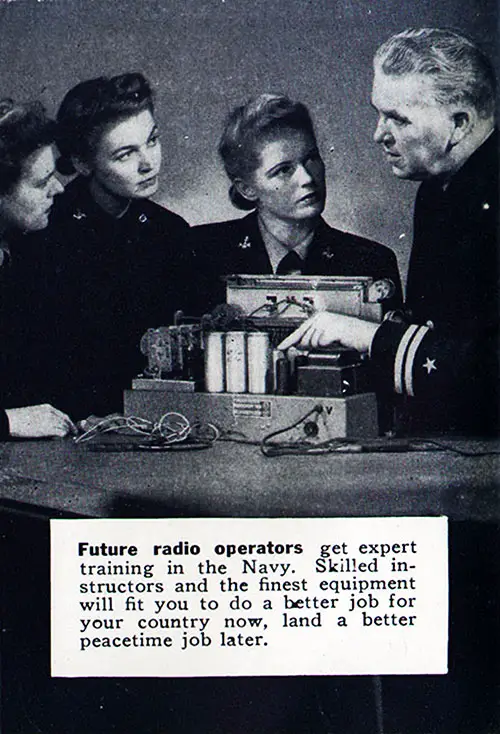
Future Radio Operators Get Expert Training in the Navy. Skilled Instructors and the Finest Equipment Will Help You Do a Better Job for Your Country Now and Land a Better Peacetime Job Later. Serve Your Country in Waves or Spars, 9 January 1943. | GGA Image ID # 2231be8af1
You'll get "week-ends" at the discretion of your Commanding Officer, and you can have dates. In other words, while you'll work hard and keep to a military schedule, you'll also live in pleasant surroundings with girls you'll be glad to call your friends.
And then, when you've successfully finished your training, you're ready for the real thing — assignment to full-time duty at a Navy or Coast Guard base within the continental United States.
"I'm making as much money as I ever did in my office job," says former typist Sally Grant, now Yeoman Grant of the WAVES. "My pay and allowances come to more than $35 a week. And I expect a promotion soon!"
Estelle Marshall had long been an amateur radio operator. Now, her hobby is a good fit for one of the SPARS' most fascinating jobs. "As a Coast Guard radio operator," she says, "I'm tuning in on history as it happens!"
Julia Palmer is now holding down a large job. She had no special training but qualified for Parachute Repair work at a Navy air base. "Thanks to my Navy training," she says, "I'll rate a good job when the war ends."
Former store buyer Helen King found her job in the SPARS made-to-order.
"Storekeeping may not sound exciting, but it is," says Storekeeper King. "It's the job I like, and I'm proud to help my country by working at it."
"I'm making as much money as I ever did in my office job," says former typist Sally Grant, now Yeoman Grant of the WAVES. "My pay and allowances come to more than $35 a week. And I expect a promotion soon!"
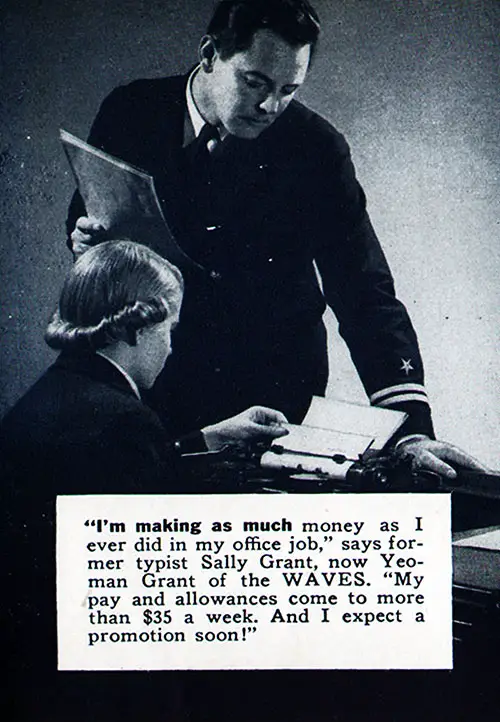
“I’m Making As Much Money As I Ever Did In My Office Job,” Says Former Typist Sally Grant, Now Yeoman Grant of the WAVES. “My Pay and Allowances Come To More Than $35 a Week. and I Expect a Promotion Soon!” Serve Your Country in WAVES or SPARS, 9 January 1943. | GGA Image ID # 2231cdb7da
You could take over a Yeoman's job as secretary to a Naval or Coast Guard Officer and release a man to serve on one of Uncle Sam's new battleships or in the coastal patrol. Perhaps you get a radio position at one of the Navy's air bases, and an Aviation Radioman becomes free to fly—and fight—with the Naval air forces.
Whatever your job, you will carry the same responsibilities, exchange salutes, and command the same respect as any other member of the uniformed forces. You'll be doing a job — not as a man or woman — but as an American!
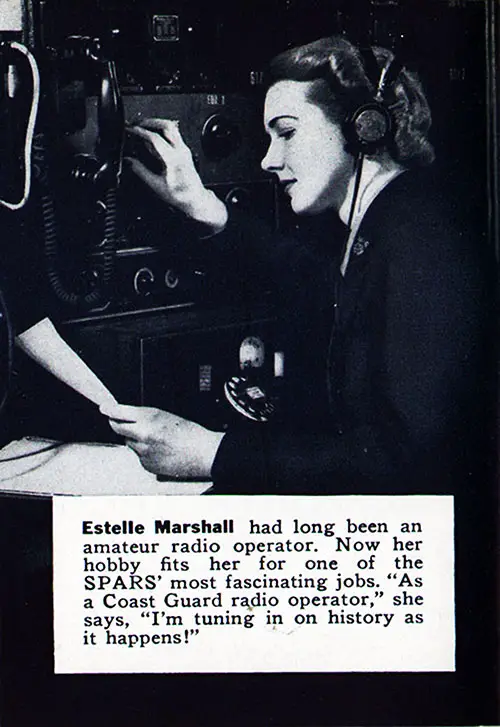
Estelle Marshall Had Long Been an Amateur Radio Operator. Now Her Hobby Is a Good Fit for One of the SPARS’ Most Fascinating Jobs. “As a Coast Guard Radio Operator,” She Says, “I’m Tuning in on History As It Happens!” Serve Your Country in WAVES or SPARS, 9 January 1943. | GGA Image ID # 2232d069ba
Where will you serve?
Like any member of the Navy, you will be assigned to duty where you are most needed — except that you will not be asked to serve outside the continental United States. Among the possibilities are Miami, San Diego, Norfolk, Washington, D. C., the Navy Yard at Boston, the air bases at Corpus Christi or Jacksonville, or any other Naval or Coast Guard establishment where a well-trained woman can replace a man.
You will not select the base where you will be stationed. Still, your request for service in a particular place will be given consideration as long as it does not conflict with the needs of the Navy or Coast Guard.
How will you live?
Your living and eating quarters will depend upon the location at which you are stationed. In some places, racks may be specially built for this purpose. In towns where there are a large number of WAVES or SPARS, they will probably be housed in groups. You may arrange for your quarters at other places. In this case, you will receive an additional allowance to cover your food and accommodation expenses.
$200 worth of clothes Free!
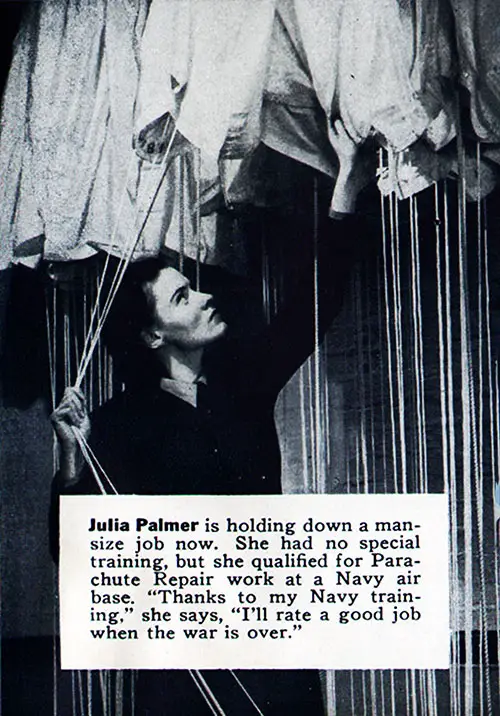
Julia Palmer Is Holding Down a Man-Size Job Now. She Had No Special Training but Qualified for Parachute Repair Work at a Navy Air Base. “Thanks to My Navy Training,” She Says, “I’ll Rate a Good Job When the War Ends.” Serve Your Country in WAVES or SPARS, 9 January 1943. | GGA Image ID # 22330e684e
It's a proud moment when you first step out in brand-new Navy blues! The trim uniform was specially designed by the famous stylist Mainbocher to flatter every figure and make you look—and feel—your best!
When you arrive at training school as an enlisted WAVE or SPAR, you will be given an allowance of $200 for uniforms and other clothing. The official uniform consists of "everything that shows," except shoes and gloves. The cost — about $160 — is covered by the $200 allowance. A balance of approximately $40 is provided for shoes, underclothing, and any other necessary items.
The WAVES and SPARS uniforms are the same except for the lapel insignia and hat band. It consists of the following articles:
Soft-crowned hat with a rolled brim and a black band.
A short Navy blue jacket with slightly built-up shoulders, a new rounded collar, and a pointed lapel. The insignia for WAVES is blue and white, and for SPARS, it is gold.
- Flattering, six-gored skirt.
- Reserve blue and dark blue shirts.
- Black seaman's tie.
- Smart, over-the-shoulder, leather pouch bag (Optional).
- White gloves in summer, black in winter.
- Beige lisle hose.
- Black oxfords, heels not exceeding 1 inch.
- Raincoats and havelocks (also known as rain hats) have become a form of protection against bad weather.
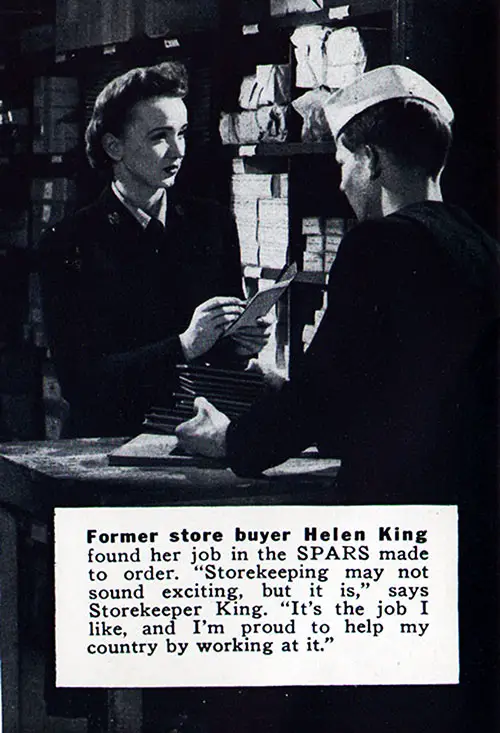
Former Store Buyer Helen King Found Her Job in the SPARS Made-To-Order. ‘‘Storekeeping May Not Sound Exciting, but It Is,” Says Storekeeper King. “It’s the Job I Like, and I’m Proud to Help My Country by Working at It.” Serve Your Country in WAVES or SPARS, 9 January 1943. | GGA Image ID # 2233446476
As an enlisted Wave or Spar, you earn up to $126 monthly — plus allowances.
Many women are now earning as much money in the WAVES and SPARS as they ever did in their civilian jobs. You will enlist as an Apprentice Seaman at a monthly salary of $50. And remember that money is your base pay, just a part of your income, because, in addition, all your living expenses are paid.
You'll get good food, comfortable quarters, the finest medical and dental care, and $200 worth of clothing — all free. In cases where government facilities are unavailable, you'll receive subsistence and quarters allowances totaling $2.75 a day in addition to your pay.
Also, as a member of the WAVES or SPARS, you will be entitled to allowances for your dependents on the same basis as men in the Navy or Coast Guard. You can buy life insurance at the same low government rates. And, like any other member of the uniformed services, you will receive free mail privileges, reduced transportation rates, and movie and theatre tickets, where applicable. You may benefit from organizations such as the USO, Red Cross, and Navy Relief.
The Navy wants you to become skilled in your job. You don't have to ask for promotions. You can go ahead fast. If you're willing and able, they'll come to you automatically. And each one is accompanied by a raise in pay.
The table below shows the steps by which you can advance and the base pay you'll receive as an enlisted WAVE or SPAR:
SEE HOW YOUR NAVY PAY GOES UP
RATE MONTHLY BASE PAY*
- Apprentice Seaman $50
- Seaman, Second Class $54
- Seaman, First Class $66
- Petty Officer, Third Class $78
- Petty Officer, Second Class $96
- Petty Officer, First Class $114
- Chief Petty Officer, Acting Appointment $126
*Subsistence and quarters allowances are in addition to your base pay.
Sample questions from the aptitude test required of all WAVES and SPARS.
If you have had two years of high school or business school, you should pass easily. No preparation is required.
It's a proud moment when you raise your right hand and swear allegiance to your country. From then on, you step into a new life—in the service of Uncle Sam!
Can you meet these requirements?
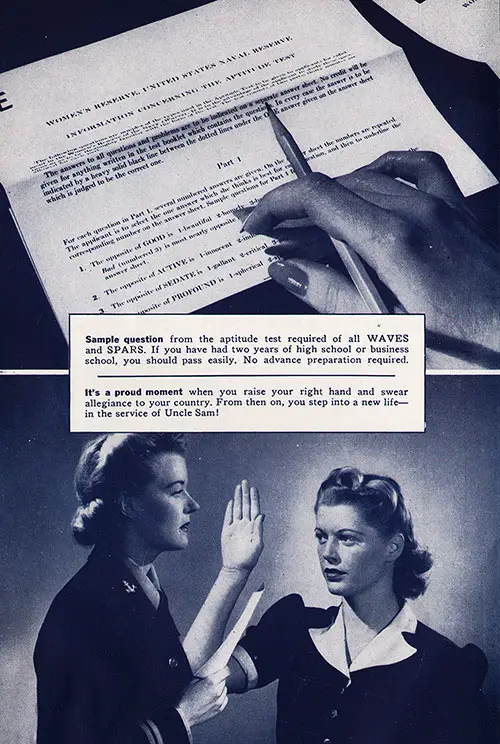
Top: Sample Question From the Aptitude Test Required of All WAVES and SPARS. if You Have Had Two Years of High School or Business School, You Should Pass Easily. No Preparation Required. Bottom: It’s a Proud Moment When You Raise Your Right Hand and Swear Allegiance to Your Country. From Then on, You Step Into a New Life— in the Service of Uncle Sam! Serve Your Country in WAVES or SPARS, 9 January 1943. | GGA Image ID # 22336ff3cd
Here Are the Requirements for Enlisted Women
Check your qualifications against them.
Term of Enlistment: You will enlist for the duration of the war. You will be discharged within six months after the war ends.
Citizenship: You must be a native-born American, or if you are not native-born, you or your parents must have naturalization papers. You must show written proof of citizenship when you apply.
Age: On the date of enlistment, you must be at least 20 years old and not yet have reached your 36th birthday. If you are under 21, you must have the written consent of your parents or guardian.
Marriage: A married woman may enlist in the WAVES, provided her husband is not in the Navy. A married woman may enlist in the SPARS, provided her husband is not a member of the Coast Guard. You may not marry during indoctrination and /or training. After indoctrination and training, if you marry a man in the Navy (in the case of a WAVE) or a man in the Coast Guard (in the case of a SPAR), you must resign or be discharged.
Dependents: Women with children under 18 will not be accepted for enlistment in the WAVES or SPARS.
Character: The Navy and Coast Guard want women of good character. When you enlist, you will be asked to furnish three references.
Education: You must have two years of high school or business school.
Experience: You will be asked to submit a record of your occupation since leaving school.
Physical: With your completed application, you must submit a statement from your family doctor confirming that you are in good health. Later, before you are sworn in, you must pass a thorough physical examination by Navy doctors.
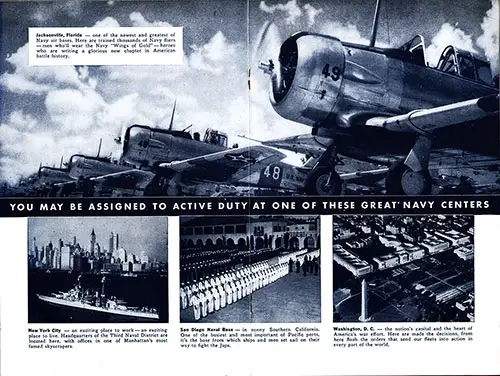
Jacksonville, Florida — One of the Newest and Greatest Navy Air Bases. Here Are Trained Thousands of Navy Fliers — Men Who’ll Wear the Navy “Wings of Gold” — Heroes Writing a Glorious New Chapter in American Battle History. You May Be Assigned to Active Duty at One of These Great Navy Centers, New York City — an Exciting Place to Work and Live. Headquarters of the Third Naval District Are Located Here, With Offices in One of Manhattan’s Most Famed Skyscrapers. San Diego Naval Base — in Sunny Southern California. One of the Busiest and Most Important of Pacific Ports, It’s the Base From Which Ships and Men Set Sail on Their Way to Fight the Japanese. Washington, D. C. — the Nation’s Capital and the Heart of America’s War Effort. Here Are the Decisions. From Here, the Orders That Send Our Fleets Into Action in Every Part of the World Flash. Serve Your Country in WAVES or SPARS, 9 January 1943. | GGA Image ID # 223386cf05
Height: You must be at least 5 feet.
Weight: You must weigh at least 95 pounds, and your weight must be in proportion to your general body build.
Eyes: Your vision must be not less than 600 in the worst eye, with binocular vision (two eyes) not less than 12/20. Each eye must be correctable to 20/20 with glasses. Note: 12/20 vision means that you can read at 12 feet what perfect eyes can read at 20.
Hearing: You must be able to distinguish whispered words at a distance of 15 feet.
Teeth: Your natural teeth must be in good condition, or you must have satisfactory replacements.
Officers in the WAVES and Spars
College women can earn commissions in the WAVES and SPARS. Most of them will qualify as Ensigns. A limited number (as specified by the Act of Congress) can become Lieutenants (Junior Grade) and Lieutenants (Senior Grade). They will draw the same pay and allowances as male Officers of equivalent rank in the Navy. Uniforms for officers will be the same as for the enlisted personnel except for the officers' hats, gold buttons, white dress shirts, and reserve blue stripes, which designate their rank.
Officers in the WAVES and SPARS will hold responsible positions. Previous experience in many fields will be valuable to the Officer candidate. Still, it is not by any means a "must" requirement. In addition to college training, the chief qualifications are alertness, energy, integrity, leadership qualities, and the urge to serve your country.
Women who have held positions in business, such as personnel officers with experience in handling groups of women, teachers, and recreational directors, all these can serve as Officers in the WAVES and SPARS, doing work very similar to that in which they have been engaged in civilian life. Also needed are women
WAVE OFFICERS present a picture of military snap and precision as they undergo inspection following graduation from the indoctrination course.
Who has had technical training and practical experience in engineering, communications, electronics, physics, radio, and similar fields?
Officer candidates are enlisted as Apprentice Seamen. After completing one month's indoctrination, they will be appointed Reserve Midshipmen. Some will continue in this status for an additional month's training, at the successful completion of which they will be commissioned Officers in appropriate rank and assigned to active duty ashore.
Others will continue in the status of Reserve Midshipmen for an additional training period of seven weeks, at the successful completion of which they will be commissioned Officers in appropriate rank and assigned to active duty ashore.
All candidates for commissions in the WAVES and SPARS will receive their preliminary training at either Smith College, Northampton, Massachusetts, or Mount Holyoke College, South Hadley, Massachusetts.
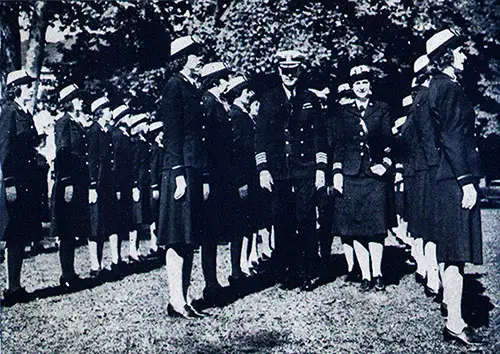
Wave Officers Present A Picture Of Military Snap And Precision. Serve Your Country In WAVES or SPARS, 9 January 1943. | GGA Image ID # 22338bf69e
Requirements for Officers
Candidates for commissions in the WAVES and SPARS must meet the exact requirements as enlisted women except in 3 respects :
AGE—At the date of enlistment, 20 to 49 inclusive.
EDUCATION — College degree or two years of college work plus at least two years of acceptable business or professional experience. Also, two years of mathematics in high school or college are required for the WAVES.
PHYSICAL— Same as for enlisted women with these two exceptions:
1. Eyes: Minimum vision in each eye 12, 20, corrected to 20/20.
2. Teeth: Minimum of 18 sound teeth, with at least two molars opposing on each side and four opposing front teeth.
For a blank application for a commission in the WAVES or SPARS, write to the nearest Navy Recruiting Station or Office of Naval Officer Procurement listed on the last pages of this booklet. Or if there is an office close by, you may call in person.
With your request, enclose the following information: (1) age and date of birth; (2) education; (3) marital status; (4) the number and ages of your children; (5) husband's occupation.
ENLISTED WOMEN MAY BECOME OFFICERS. The only way a non-college woman can win a commission in the WAVES or SPARS is to come up "through the ranks." Not many will qualify. It calls for hard work and actual ability, but it is a goal well worth trying for.
First, go or write to the nearest Navy Recruiting Station or Office of Naval Officer Procurement for application blanks. Provide the required information, and return the papers to the office of origin.
If your application papers are satisfactory, you'll receive complimentary transportation to the nearest Office of Naval Officer Procurement. There, you'll be interviewed and arranged to take the aptitude test.
Then comes a physical check-up by Navy doctors. Requirements are thorough but not too difficult. Any young woman in sound health should be able to pass the examination with flying colors.
It's thrilling when you raise your right hand and are "sworn in." From then on, you'll be in the service of Uncle Sam, ready to do a man-size job for your country!
Off for training school! The Navy takes care of all expenses. Meals in the dining car. A Pullman berth for overnight travel. And you'll find comfortable accommodations ready for you upon arrival.
Yes, it's you! You'll feel proud — and rightly so — when you first see yourself in trim Navy blues. Complete outfit— $200 worth of clothing — is furnished to you free as an enlisted woman.
Training schools are located at some of the country's finest colleges. Typing, radio operation, communications, and mechanics are only some of the skills you may acquire.
At training school, you'll follow an interesting schedule. In addition to the valuable training under expert Navy teachers, you can enjoy athletics, games, and recreation with friendly companions.
And now — a full-fledged service member — you go on active duty at one of the big Naval bases. You'll be in the thick of all that's exciting and important in America at war.
Yes, your salute will be recognized even by an Admiral. And you deserve recognition! For you, it is a significant responsibility — a service to your country that you will be proud of for the rest of your life.
Any questions about WAVES or SPARS? You'll find the answers here
- Q. As a WAVE or SPAR, will I be expected to serve overseas?
- A. The law passed by Congress limits your service to the continental limits of the United States.
- Q. What is the term of enlistment?
- A. For the duration of the war. You will be discharged within six months after the war ends.
- Q. After I have once joined, may I resign?
- A. A, letter to your Commanding Officer, requesting discharge and stating your reason, will be forwarded for consideration. But in wartime, resignations are discouraged.
- Q. If I am under 20 and my parents consent, can I enlist?
- A. No. By law, the minimum age is 20.
- Q. If I fail the aptitude test, can I retake it?
- A. No.
- Q. If I have no special training, will I be eligible?
- A. Yes. In addition to women with specialized training, the WAVES and SPARS definitely want women of high caliber but no special training.
- Q. Am I on active duty as soon as I am sworn in?
- A. Not necessarily. You may be told A. to report home on inactive duty to await further orders or be ordered to proceed to a training school immediately.
- Q. When does my pay begin?
- A. The day you report to training school.
- Q. Should I quit my old job as soon as I am sworn in?
- A. No. Do not resign until you are ordered to training school.
- Q. Must all WAVES and SPARS start as Apprentice Seamen?
- A. Yes. But after completing the indoctrination and training period, you are automatically promoted to a higher rating. From then on, your promotion depends on your ability and length of service.
- Q. May I change the type of work I am doing?
- A. Yes. You may submit a request to your Commanding Officer to be forwarded for consideration.
- Q. Do I pay my own way to training school?
- A. No. The Navy pays for your transportation.
- Q. How long will my training period be?
- A. The training period will average about four months.
- Q. Can an enlisted woman request training in a particular field—for instance, radio—even if she has had no previous training in that field?
- A. Yes. But it cannot be guaranteed that the request will be granted.
- Q. When do I get my uniform?
- A. After you arrive at training school. However, you should bring enough civilian clothing for a week or two.
- Q. What will my hours be at training school?
- A. The hours will depend on the school you attend. However, they will be on a military basis—Reveille, taps, etc.
- Q. Will I learn military drill?
- A. Yes.
- Q. Will there be an organized exercise?
- A. Yes. There will be a physical director at each school, and the athletic program will be keyed to the type of work you will do.
- Q. Will there be religious services?
- A. Yes. Each training school will make appropriate arrangements.
- Q. Am I allowed to have dates during training?
- A. Yes. You may have dates during your free time.
- Q. Will I get weekend leave from training school?
- A. Yes, at the discretion of the Commanding Officer.
- Q. Will I be subject to military discipline after training?
- A. The extent of discipline depends on where you are stationed and what sort of work you are doing. Obviously, those living in barracks will be subject to more discipline than those living alone.
- Q. What about working hours, leaves, and dates after training?
- A. All these will be determined by the work you are doing and the post where you are stationed.
- Q. What supervision will there be over my living quarters?
- A. Wherever WAVES or SPARS live in groups, they will be adequately supervised, and proper living standards will be maintained. Where girls live individually, the Navy will recommend suitable quarters.
- Q. Will I be permitted to marry after the training period?
- A. Yes, except a man in your corresponding branch of the service. If you were to marry such a man, you would be discharged or asked to resign.
- Q. What happens if I become pregnant?
- A. You will be honorably discharged from the Navy or Coast Guard.
- Q. May I request duty at any particular Naval or Coast Guard Station?
- A. Yes, but your request may or may not be granted.
- Q. As an enlisted woman, will I be subject to the same rules and regulations as an enlisted Navy man?
- A. Yes.
- Q. Will I get the same pay?
- A. Yes.
- Q. Are there any allowances for dependents?
- A. Yes, the same as for Navy men.
- Q. Can I buy life insurance at the same low rates as Navy men?
- Yes.
- Q. Will I get free mail privileges, discounts on transportation, movies, etc.? Will I benefit from US 0, Red Cross, Navy Relief, etc.?
- A. Yes, on the same basis as male members of the armed services.
- Q. May I wear make-up?
- A. Yes, a reasonable amount.
- Q. Must hair be cut short or worn in any particular style?
- You may wear it in any style that is becoming to you, but it should be short enough not to cover your collar.
- Q. If I do not receive an application blank immediately after writing a letter for one, does it mean I am rejected?
- A. No. Every effort will be made to send blanks out as soon as letters are received. If you do not receive yours within a week, telephone or write, stating the case.
- Q. If I'm not asked to come in for an aptitude test, does it mean I am rejected?
- A. No. Even though you are qualified, there may not be a position open at the moment that can properly utilize your talents. You will be asked to come in for an aptitude test as soon as the need for your services develops.
- Q. What papers would it be helpful for a candidate to start obtaining as soon as she decides she would like to join the WAVES or SPARS?
- A.
- Evidence of citizenship—birth or baptismal certificate.
- Transcript of your educational record.
- Record of occupation since leaving school.
- Three letters of recommendation from prominent citizens who know you.
- Health statement from your family doctor.
- Marriage certificate, if married. Divorce papers, if divorced.
- Q. Can an enlisted woman ever work up to a commission?
- A. Yes. Your application will be evaluated based on your demonstrated capacity and ability.
- Q. Could I qualify for a commission with only two or three years of college work?
- A. Yes, provided you have also had exceptional experience in administrative, executive, or technical work. But you must have had at least two years of college.
- Q. What is the difference between the uniform of an enlisted woman and that of an Officer?
- A. Little difference — except for hat, shirt, gold buttons instead of blue, and officer stripes on sleeves. Officers wear white shirts for dress, and blue for work. Enlisted women wear reserve blue or dlark blue shirts.
- Q. If an Officer Candidate fails to complete her training period successfully, will she be transferred to the regular enlisted ranks or discharged?
- A. She may have her option.
- Q. What is the pay scale for Officers?
- A. Ensign: $150.00 base pay and allowances, amounting in all to about $216.00 a month. Lieutenant (junior Grade): $166.67 base pay and allowances, amounting in all to about $247.00 a month. Lieutenant (Senior Grade): $200.00 base pay and allowances, totaling approximately $296.00 per month.
- Q. How much are Officers allowed for uniforms?
- A. $250.
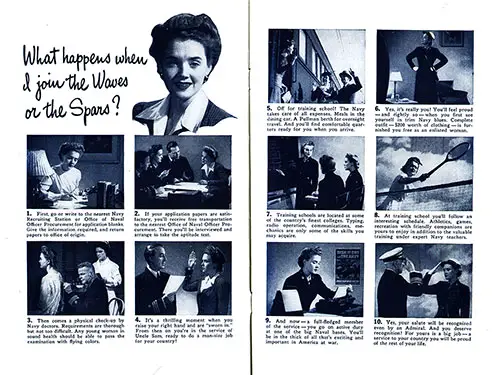
What happens when I join the WAVES or SPARS? Serve Your Country In WAVES or SPARS, 9 January 1943. | GGA Image ID # 2233a0b23c
Captions from the Image Above
1. First, go or write to the nearest Navy Recruiting Station or Office of Naval Officer Procurement for application blanks. Give the information required, and return papers to office of origin.
2. If your application papers are satisfactory, you’ll receive free transportation to the nearest Office of Naval Officer Procurement. There you’ll be interviewed and arrange to take the aptitude test.
3. Then comes a physical check-up by Navy doctors. Requirements are thorough but not too difficult. Any young woman in sound health should be able to pass the examination with flying colors.
4. It’s a thrilling moment when you raise your right hand and are “sworn in.” From then on you’re in the service of Uncle Sam, ready to do a man-size job for your country!
5. Off for training school! The Navy takes care of all expenses. Meals in the dining car. A Pullman berth for overnight travel. And you’ll find comfortable quarters ready for you when you arrive.
6. Yes, it’s really you! You’ll feel proud — and rightly so — when you first see yourself in trim Navy blues. Complete outfit — $200 worth of clothing — is furnished you free as an enlisted woman.
7. Training schools are located at some of the country’s finest colleges. Typing, radio operation, communications, mechanics are only some of the skills you may acquire.
8. At training school you’ll follow an interesting schedule. Athletics, games, recreation with friendly companions are yours to enjoy in addition to the valuable training under expert Navy teachers.
9. And now — a full-fledged member of the service — you go on active duty at one of the big Naval bases. You’ll be in the thick of all that’s exciting and important in America at war.
10. Yes, your salute will be recognized even by an Admiral. And you deserve recognition! For yours is a big job — a service to your country you will be proud of the rest of your life.
How to apply for the WAVES or SPARS
1. First, go in person or write to the nearest Navy Recruiting Station (see pages 21-22-23-24) and ask for WAVES or SPAR application blanks. Or, if more convenient, you may go or write to the nearest Office of Naval Officer Procurement listed on page 25.
2. When you apply, be sure to give the following information : (a) your age and date of birth; (b) your education; (c) your marital status —married, unmarried, widowed, divorced; (d) if you have any children, how many and the age of each; (e) if you are married, your husband's occupation.
3. If you appear to qualify on the basis of the information you give, you will receive an official application blank and other necessary papers. Fill in all the information requested about your qualifications, get your 3 character references and your family doctor's statement of your physical condition and return all papers to the office from which you secured them.
4. If your application is accepted, you will be sent — with transportation paid — to the nearest Office of Naval Officer Procurement for an interview, aptitude test and your Navy physical examination. If you pass these successfully, you will be sworn in — ready to serve your country and release a man to fight at sea. If you fail, transportation will be paid to your home.
Call or write for your application blank at the nearest office listed on the following pages.
Brief Notes on “Notable Figures” mentioned 👩✈️
Frank Knox — Secretary of the Navy (1940–1944); previously a newspaper publisher and WWI veteran. His signature message adds cabinet-level weight to the brochure’s call for women’s service.
Mainbocher (Main Rousseau Bocher) — Renowned American couturier; his WAVES/SPARS uniform designs balanced practicality and presentable style, helping normalize women’s military professionalism.
Additional Images
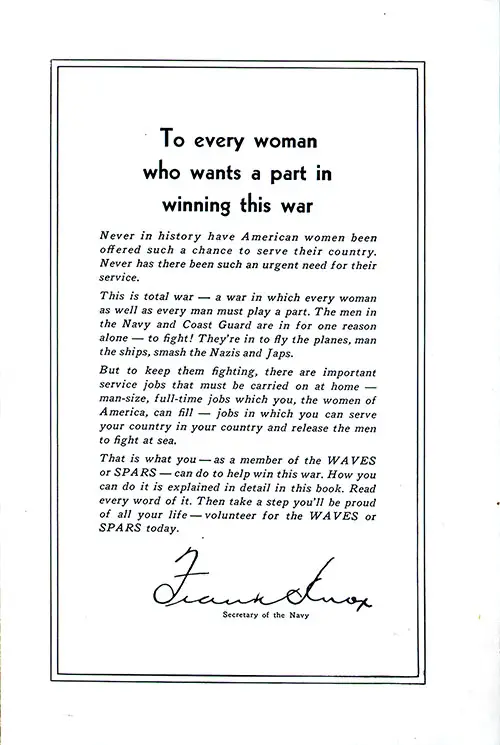
Letter from Frank Knox, Secretary of the Navy To Every Woman Who Wants a Part in Winning This War. Serve Your Country In WAVES or SPARS, 9 January 1943. | GGA Image ID # 223444eb3e
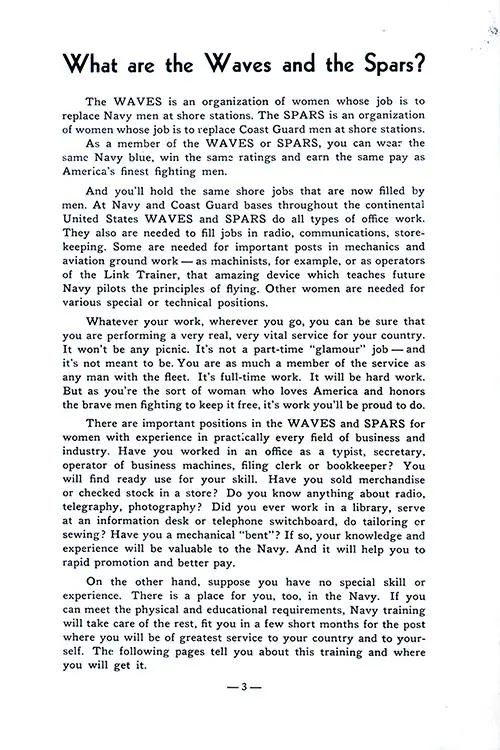
What are the WAVES and the SPARS? Serve Your Country In WAVES or SPARS, 9 January 1943. | GGA Image ID # 223454f72d
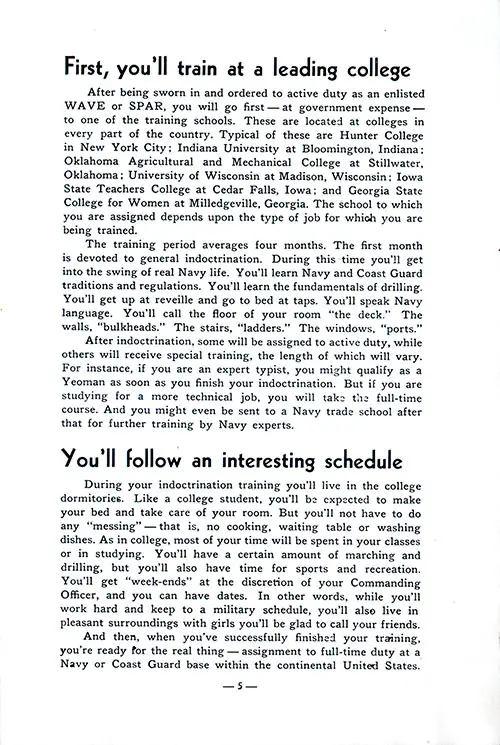
Training and Schedule for WAVES and SPARS. Serve Your Country In WAVES or SPARS, 9 January 1943. | GGA Image ID # 22347c58cb
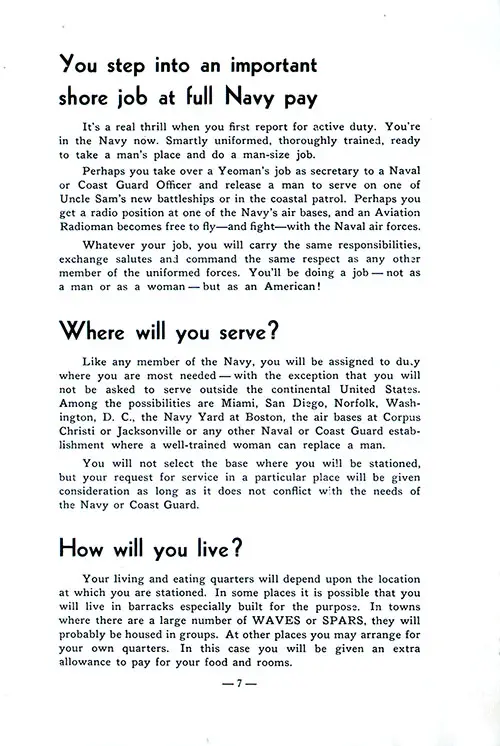
You Step Into an Important Shore Job at Full Navy Pay. Where You Will Serve. How Will You Live. Serve Your Country In WAVES or SPARS, 9 January 1943. | GGA Image ID # 2234f5da89
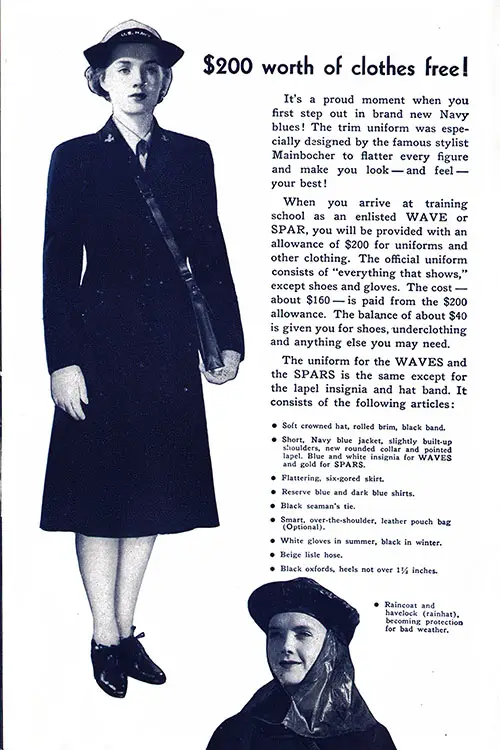
$200 Worth of Clothes Free! Serve Your Country In WAVES or SPARS, 9 January 1943. | GGA Image ID # 2235105667
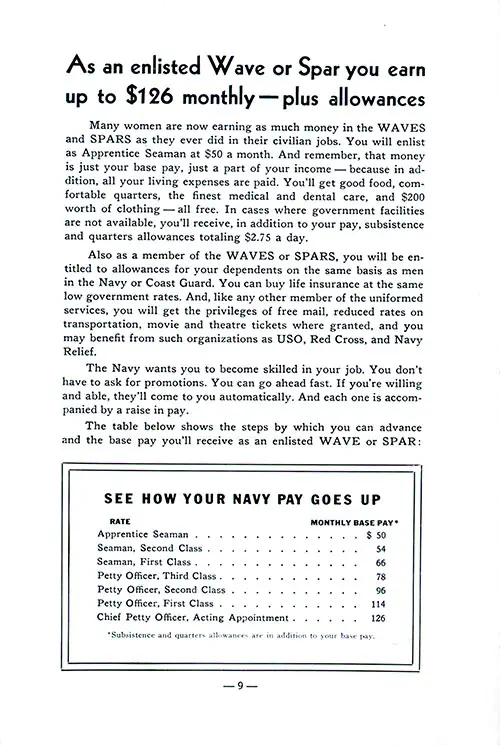
As an Enlisted Wave or Spar You Earn up to $126 Monthly Plus Allowances. Serve Your Country In WAVES or SPARS, 9 January 1943. | GGA Image ID # 22353d59d2
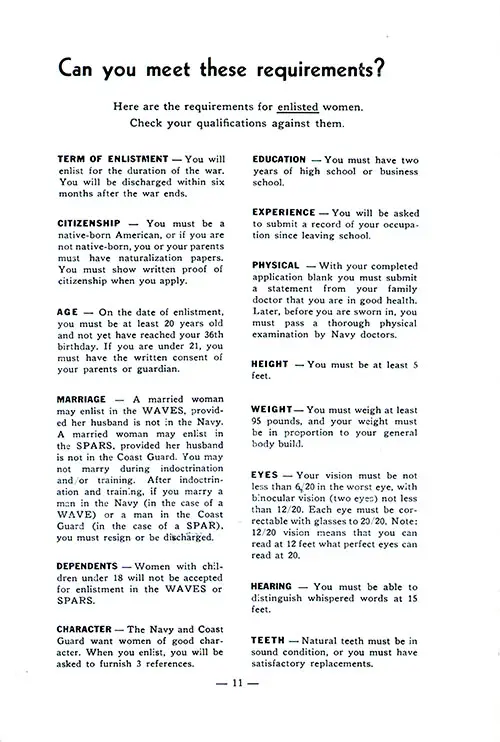
Requirements for Enlisted Women. Serve Your Country In WAVES or SPARS, 9 January 1943. | GGA Image ID # 22354b9ca6
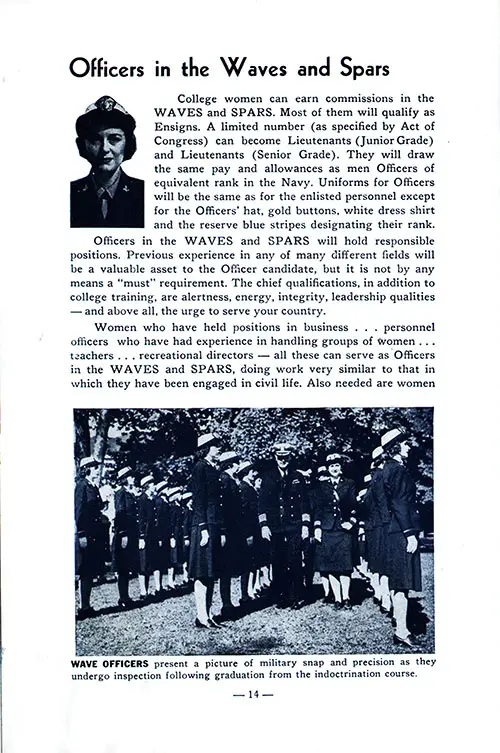
Officers in the WAVES and SPARS. Serve Your Country In WAVES or SPARS, 9 January 1943. | GGA Image ID # 223589e517
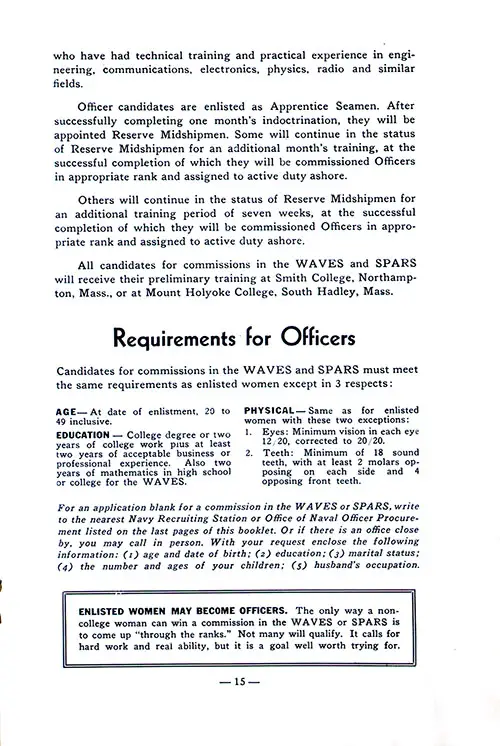
Requirements of Officers in the WAVES or SPARS. Serve Your Country In WAVES or SPARS, 9 January 1943. | GGA Image ID # 223595349c
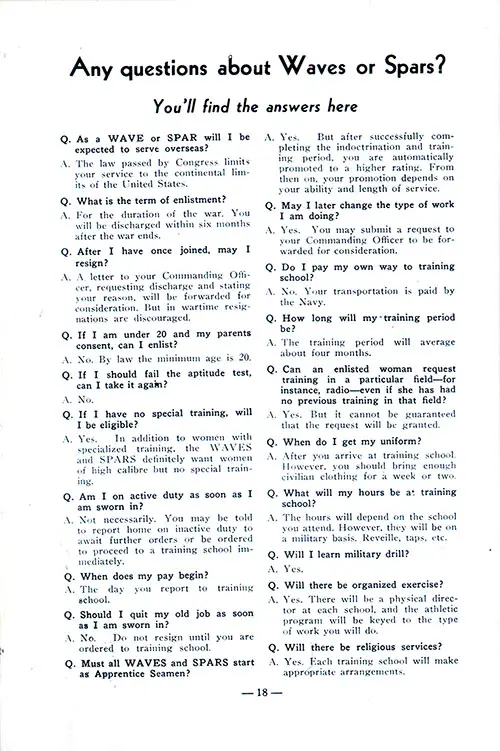
Q&A About WAVES and Sparts, Part 1 of 2. Serve Your Country In WAVES or SPARS, 9 January 1943. | GGA Image ID # 2235b411ee
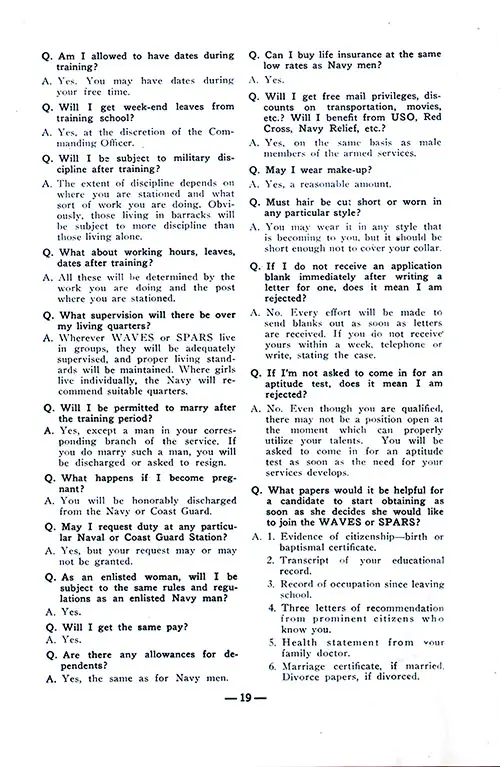
Q&A About Waves and Sparts, Part 2 of 2. Serve Your Country In WAVES or SPARS, 9 January 1943. | GGA Image ID # 2235ce1005
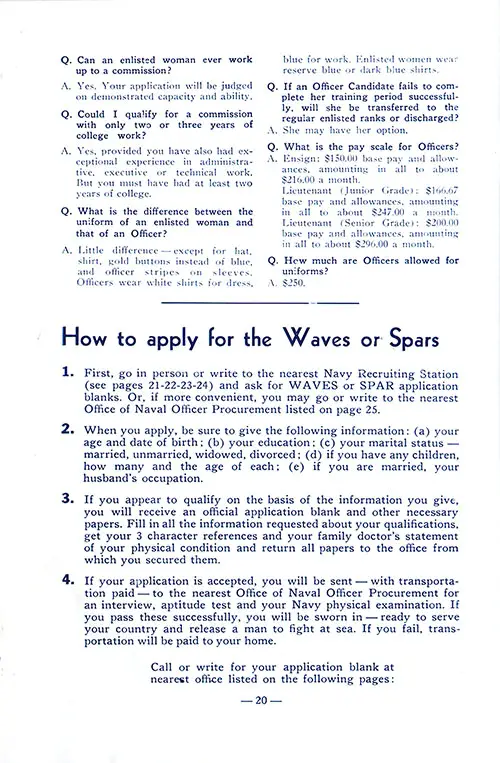
Q&A About WAVES and Sparts, Part 3 of 3. How to Apply for WAVES or SPARS. Serve Your Country In WAVES or SPARS, 9 January 1943. | GGA Image ID # 22365b205b
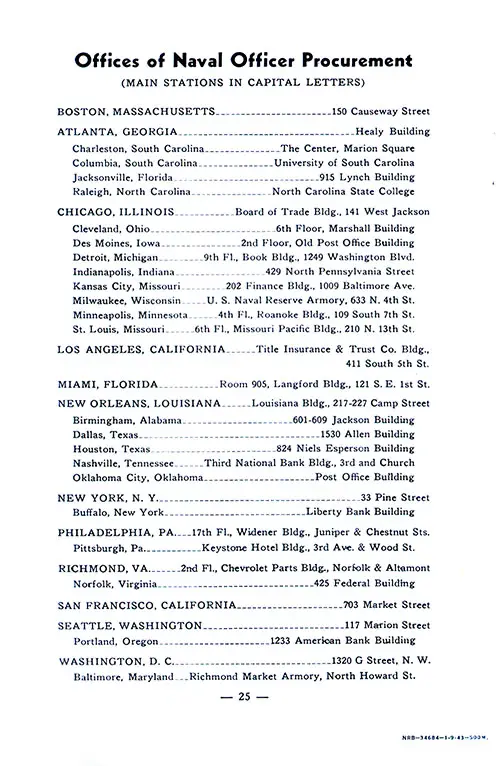
Offices of Naval Officer Procurement. Serve Your Country In WAVES or SPARS, 9 January 1943. | GGA Image ID # 22368e3b8c
NR13-34684-1-9.43-500M. 1943-01-09 How To Serve Your Country In The WAVES or Spars
Noteworthy Images 🖼
Front Cover (GGA Image ID #2230ac1d05) — Iconic recruitment framing, ideal as a hero image.
Radio Control Tower Duty (GGA Image ID #2230c7beb0) — Highlights aviation support and responsibility.
Dorm Life & Dining (GGA Image IDs #2230cc4924, #223129b822) — Makes training tangible and relatable.
Future Radio Operators (GGA Image ID #2231be8af1) — Emphasizes technical skill building.
Aptitude Test & Oath (GGA Image ID #22336ff3cd) — Captures selection standards and the solemnity of service.
“$200 Worth of Clothes Free!” (GGA Image ID #2235105667) — Visual anchor for uniforms/allowance.
Officers’ Inspection (GGA Image ID #22338bf69e) — Professionalism and advancement pathway on display.
Apprentice Seaman $50 in 1943
$50 (Apprentice Seaman base pay, 1943) ≈ $880 CPI-adjusted (order-of-magnitude), with wider ranges depending on measure.
Petty Officer, First Class $114 in 1943
$114 (PO1 base pay, 1943) ≈ $2,010 CPI-adjusted
Clothing Allowance $200 in 1943
$200 (uniform allowance) ≈ $3,520 CPI-adjusted.
If you need help determining which result is most appropriate for you, check out the Tutorials or see Choosing the Best Measure of Relative Worth. For an in depth discussion, read the Measures of Worth essay.
Samuel H. Williamson, "Seven Ways to Compute the Relative Value of a U.S. Dollar Amount, 1790 to present," MeasuringWorth, 2025.
Rank Key (Officer, NCO, Enlisted) 🎖️
- Apprentice Seaman (AS) → E-1 entry level (WWII usage; later “Seaman Recruit”).
- Seaman Second Class (S2c) → junior enlisted (later “Seaman Apprentice”).
- Seaman First Class (S1c) → senior enlisted (later “Seaman”).
- Petty Officer Third/Second/First Class (PO3/PO2/PO1) → NCO tiers (technical leaders).
- Petty Officer, Third Class: Junior NCO rank
- Petty Officer, Second Class: Mid-level NCO rank
- Petty Officer, First Class: Senior NCO rank
- Chief Petty Officer (CPO / Acting CPO) → senior enlisted leadership.
- Ensign (ENS) → entry officer.
- Lieutenant (Junior Grade) – LTJG → O-2.
- Lieutenant (LT) → O-3.
Dictionary of Terms & Abbreviations a Civilian Might Not Know 📗
- WAVES — Women Accepted for Volunteer Emergency Service (U.S. Navy).
- SPARS — U.S. Coast Guard Women’s Reserve; name from the motto Semper Paratus.
- Yeoman (YN) — Administrative/clerical specialist.
- NCO: Non-Commissioned Officer, an enlisted member with leadership responsibilities
- Storekeeper (SK) — Supply and inventory specialist (modern “Logistics Specialist”).
- Link Trainer — Early flight simulator used for instrument training.
- Indoctrination — Initial military training and orientation.
- Rank: The level of authority or position in the military hierarchy
- Rating — Navy job specialty (e.g., Yeoman, Storekeeper).
- Reveille / Taps — Bugle calls for wake-up / lights-out.
- CONUS — Continental United States (WAVES/SPARS were limited to CONUS duty then).
- Allowance — Additional pay or in-kind provision (quarters, subsistence, uniforms).
Key Highlights and Engaging Content
Call to Action for Women to Serve
The opening lines make a powerful appeal to women, urging them to contribute to the war effort. This urgent and motivating tone makes this pamphlet engaging for those interested in understanding how women's involvement in military service was framed during the war.
The pamphlet positions women’s service as equally essential to the success of the war effort as men’s, emphasizing the crucial jobs they could fill at home to allow men to fight abroad.
Detailed Description of WAVES and SPARS Roles
The pamphlet highlights the different roles available in both the WAVES and SPARS, ranging from clerical positions to more technical jobs in radio operations, communications, and aviation mechanics.
The phrase “man-size, full-time jobs” is emphasized, ensuring that women are seen as equals in contributing to the war effort. This section would engage readers by showing the diversity of roles available and how women could take on leadership and technical positions that were traditionally reserved for men.
Training and Campus Life
One of the most interesting parts of the pamphlet is its portrayal of the training experience. Recruits were sent to colleges around the U.S., spending up to four months in training, which is described as "college life" but with military discipline.
The document mentions prominent training sites like Hunter College and Indiana University, which could intrigue readers interested in how educational institutions played a role in the war effort.
Uniforms and Benefits
The uniform section is particularly engaging. Designed by Mainbocher, the uniforms were not only practical but also stylish. This segment highlights the prestige and professionalism of the WAVES and SPARS, which could appeal to readers interested in the cultural aspects of military service during the war.
Additionally, the pamphlet goes into detail about the financial benefits, such as a $200 clothing allowance, free meals, and comfortable living quarters—all incentives that would attract women to serve.
Testimonies of Service Members
The inclusion of real stories from women who had served in the WAVES and SPARS makes the pamphlet particularly engaging. For instance, Sally Grant, a former typist, shares how she earned as much as she did in her civilian job and was looking forward to a promotion.
These personal stories add a relatable human element to the pamphlet, showing how ordinary women contributed significantly to the war effort.
Requirements for Service
The pamphlet also outlines the strict eligibility requirements for joining, including physical health, education, and age. The emphasis on physical health and education serves as a reminder of the discipline and high standards required to serve in the military, even for non-combat roles.
Final Thoughts
This pamphlet is an essential document for anyone interested in understanding the significant, often underappreciated, role of women in the military during World War II.
It provides insights into the empowerment of women during the war and offers a fascinating glimpse into the structured, yet supportive, environment of the WAVES and SPARS.
For teachers, historians, and genealogists, this document offers a wealth of information on the military contributions of women during the war, showing the diversity of roles and the impact they had in enabling men to fight.
